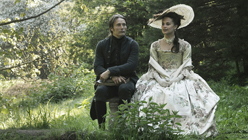The Oscar race for best foreign-language film rarely comes without a helping of muslin-and-bonnet dramas stuffed with misbehaving royals, masked balls and burgeoning job opportunities for food stylists. As heritage cinema goes, however, the year’s Academy Award entry from Denmark is a firecracker.
Though it’s dressed to kill in regulation brocade and upswept hairdos, this fact-based tale of high-born love and betrayal has a great deal more than Danish pastry on its mind. A Royal Affair is far from the first movie to show how the road to democracy is almost always washed with blood, but its release is especially timely as we witness the savagery accompanying regime change the world over.
The year is 1776, and as the rest of Europe emerges from feudal darkness, Denmark — widely admired today as a model of freedom, tolerance and benign government — remains mired in medieval fundamentalism, its impoverished people ground under the heel of a reactionary politburo whose honchos use their unstable young king, Christian VII, as a rubber stamp for maintaining despotic rule. As played by the terrific theater actor Mikkel Folsgaard, Christian is, to put it charitably, a wild card who hangs out with hookers when he should be performing husbandly duties for a new English wife, Queen Caroline Matilda, whom he calls “Mother.”
Played by Swedish actress Alicia Vikander, an insufficiently spirited looker who’s more suitably cast as demure Kitty in the upcoming Anna Karenina, the queen languishes, lonely and bored to death. She perks up — as who among us would not — with the arrival of the slow-burning Danish superstar Mads Mikkelson. Best known as the baddie from the Bond movie Casino Royale, Mikkelson plays Struensee, the King’s German physician, a devotee of Enlightenment rationalism and a shrewd reader of character who has His Wacky Majesty tamed and eating out of his hand in no time at all.

9(MDAzOTIwODA0MDEyNTA4MTM1OTcyMGJmMA001))

